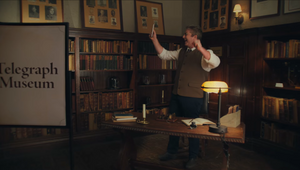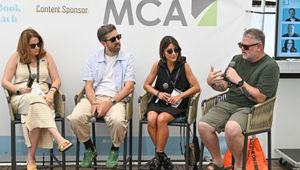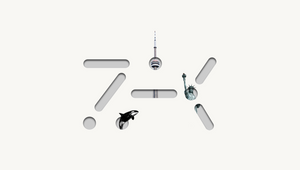
This Remembrance Day Campaign Invited Canadians to Attend Meetings with the Past

In spite of the fact that it’s been less than 100 years since World War II ended, it feels as though these days, people – especially the younger generation – are growing further and further disconnected from the atrocities of the past. Sure, there’s something to be said for the fact that today’s state of the world is a chaotic one with its own boatload of issues, but ultimately, should humanity forget the tragedies of yesterday, it’ll open itself up to repeating the same mistakes tomorrow.
Of course, there’s also the fact that a good number of the veterans are still alive. They fought, they sacrificed, and they put their lives on the line – something that should not be taken lightly. So, to serve as a refresher on why this is something that shouldn’t be forgotten, as well as honour the lives and efforts of the Canadian veterans, Zulu Alpha Kilo worked with HomeEquity Bank and the Legion National Foundation to launch ‘Meetings with the Past’.
Inspired by the discovery that one can schedule an online meeting on a date that’s already gone by – even as far back as 1917 during the first World War – the work juxtaposes the comfort and familiarity of attending everyday online meetings with the realities of a wartime world. Centred around three key battles that the Canadian Armed Forces played a pivotal role in (the Battle of the Somme, the Liberation of the Netherlands and D-Day), each meeting is narrated by experts, placing the viewer on the battlefield with the use of archival footage. Safe to say, it’s an effective reminder that maybe we should take our Monday morning meets a little less for granted.
To learn more about just what it took to bring this campaign to life, LBB’s Jordan Won Neufeldt sat down with Zulu Alpha Kilo’s chief creative officer, Brian Murray, for a chat.
LBB> From the top, what was the brief for this campaign, and what immediate ideas came to mind?
Brian> The ask was for a campaign that helped people remember the sacrifices made by Canadian veterans, and which encouraged them to donate a ‘Digital Poppy’ to the cause.
The challenge is that younger Canadians find the sacrifices of our veterans increasingly distant and unrelatable. So, as in previous years, we drew a parallel to contemporary life to frame the heroic acts of our veterans in a way that a modern audience could more easily relate to. Basically, it’s a case of communicating, ‘Yes, modern life is hectic and overwhelming. But look how bad they had it’.
LBB> The observation that one can attend meetings from years past is super cool. Where did this come from?
Brian> As with many good ideas, this came from a mistake – someone on our team sent a lunch invite for the day before, and we realised we could use it to connect with the past in a way that felt fresh.
With video calls being present in our lives more than ever, we knew this was an idea that would cause a genuine reaction from people.
LBB> When bringing a campaign of this scale to life, where does one get started? How did you begin to pull all the pieces together?
Brian> We knew that for the insight to really shine, we needed to centre the campaign around sending invites for meetings in the past. Then, we made sure that whatever people watched when they joined the meetings was powerful and relatable.
The rest of the campaign was organised and was planned to either drive people to the meetings, or give them more content besides the videos, which is what you can experience when you go to the website.
LBB> Specifically, the work centres around the Battle of the Somme, the Liberation of the Netherlands and D-Day. What made these the ones you wanted to focus on? And what was the research process like for each?
Brian> This was done very collaboratively with HomeEquity Bank and the Legion National Foundation (LNF). We wanted to include more than one war so we could pay tribute to as many veterans as possible. We had a rough idea of the major dates we wanted to work with, and the Legion guided us through the stories and facts, making sure we were touching all the major points in every moment.
We wrote a couple of versions and had the luck of having them revised by experts and historians. Not only are they factually accurate, but they’re also emotionally true to what these soldiers lived at that time.
LBB> To really bring each one to life, you also bolstered this research with narration, as well as historical documentation. How did each of these elements come to life?
Brian> We cast a different expert to be the face and voice of each video, so they carry the story and tell it as if they’re there, on the battlefield with the soldiers.
All the other scenes were sourced from archival footage and were treated with different techniques. Some were colour-corrected frame by frame, some were edited for clarity, some went through a bit of AI trickery, and some were enhanced with audio from the period. There are dozens of different clips and images for each video, painstakingly pieced together to match the script.
LBB> Importantly, as you mentioned, the work really needed to showcase the horror of war, as well as create a pivotal juxtaposition between that and modern life. Tonally, how did you work to achieve this? What did it take to ensure it landed just right?
Brian> As much as we wanted people to realise the difference between now and then, we didn’t want them to feel bad about it.
Of course, being in the trenches was a worse experience than a Monday morning meeting, so we didn’t feel the need to highlight that explicitly; instead we focused on telling these war stories the best we could. Ultimately, connecting these experiences with our contemporary lives was something we trusted the audience could do themselves.
LBB> Overall, how did each meeting come to life? Are there any cool details you can share with us?
Brian> We started with the experts at the centre of each meeting. Then, we went through hours and hours of archival footage from the wars to find scenes that matched what the expert was saying. So, for example, if he’s talking about how tanks were a major innovation at that time, we had to find tank footage that not only looked good, but was also from that very specific period.
Then, we had to stitch it all together in the edit. The biggest challenge was making sure that the amount of information was well-paced for comprehension, because there was so much going on all the time.
Some of it came together later in the process though, like the screen-sharing interventions that happen sometimes. These were details we added as we went to make the experience more immersive and realistic. But to get there, we needed a solid foundation – a great base edit – to tell the stories first.
LBB> The production quality is also excellent! Can you tell us a bit more about how you made each meeting feel immersive?
Brian> It was partly about finding the proper footage, and partly about making it look coherent. Both took quite some time.
We chose a specific colour treatment for each video that matched the technology of the time, so it felt as real as possible, and then applied it to everything, including our experts. The audio also plays a big part in the experience: we used period-appropriate SFX and played with the stereo field. So, for example, when you see a plane flying from left to right, that’s what the sound does in your headphones too.
LBB> What challenges have you faced during this project? How did you overcome them?
Brian> Finding the right tone for the content was quite tricky. We want more people to care about veterans and the selfless sacrifices they made, but we know that the message is not going to come through if you try to guilt people into donating.
Other than that, we spent quite some time reviewing archival footage and researching the day-to-day lives of soldiers during the war. Because we wanted to be precise, we needed to find footage that showed Canadians during the first and second World Wars at the exact battles we’re talking about.
LBB> Do you have any memorable lessons learned from the making of this new campaign?
Brian> The team that made all of this is really, really small. I guess one of the lessons is how much you can do with the right people, especially when you have clients and partners who are willing to help as much as HomeEquity Bank and the LNF helped us.
LBB> Finally, what did the chance to work on this campaign mean to you?
Brian> It’s an honour to work on a campaign that means so much to so many Canadians and helps raise funds for our veterans. The agency has been doing this work for a few years, and we’re lucky to do so.















